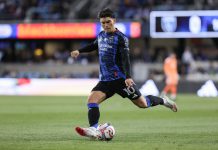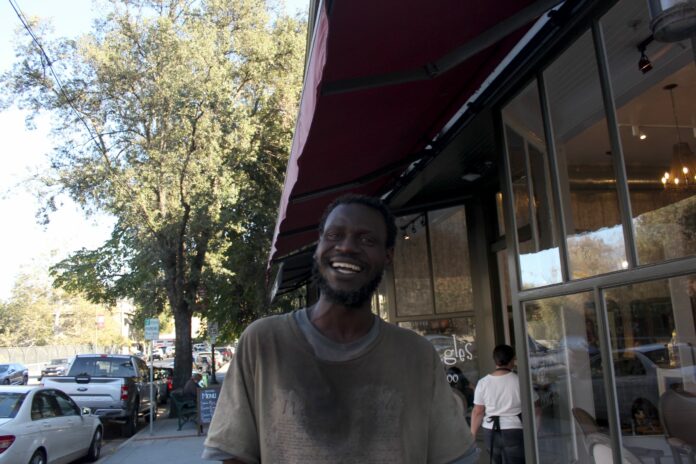
He has much in common with other residents of Los Gatos: He’s a veteran who grew up in a family with mining interests overseas. He’ll buy you a cold drink on a hot day. When he’s offered a free beer at the bar he insists on paying. He waxes poetic about the virtues of “freedom” and cares deeply about the documents produced by the Founding Fathers.
But unlike the men and women living large off their IPO wealth or carefully invested savings behind iron gates on former orchard lands, Sahr (pronounced “Sah”) Gandi Mafinda Fania sleeps outside by the entrance to the highway.
Fania enjoys walking with a cross-step. Like a child who plays at avoiding the cracks, it’s his way of meandering through life with grace. He’s trying to avoid the negative energies around him—powerful forces that seem to want to suck him back into the darker places he’s visited. “The cross-stepping is like some kind of spiritual movement,” he says. “I am going through a battle. A battle with some foreign forces. And, guess what? Sometimes they shed off.”
For him, this method of moving through the urban sphere is his way of summoning the proverbial white blood cells and antibodies and avoiding harmful entanglements. “It’s a flow, and a step. You’re stepping on something to clear your passage.”
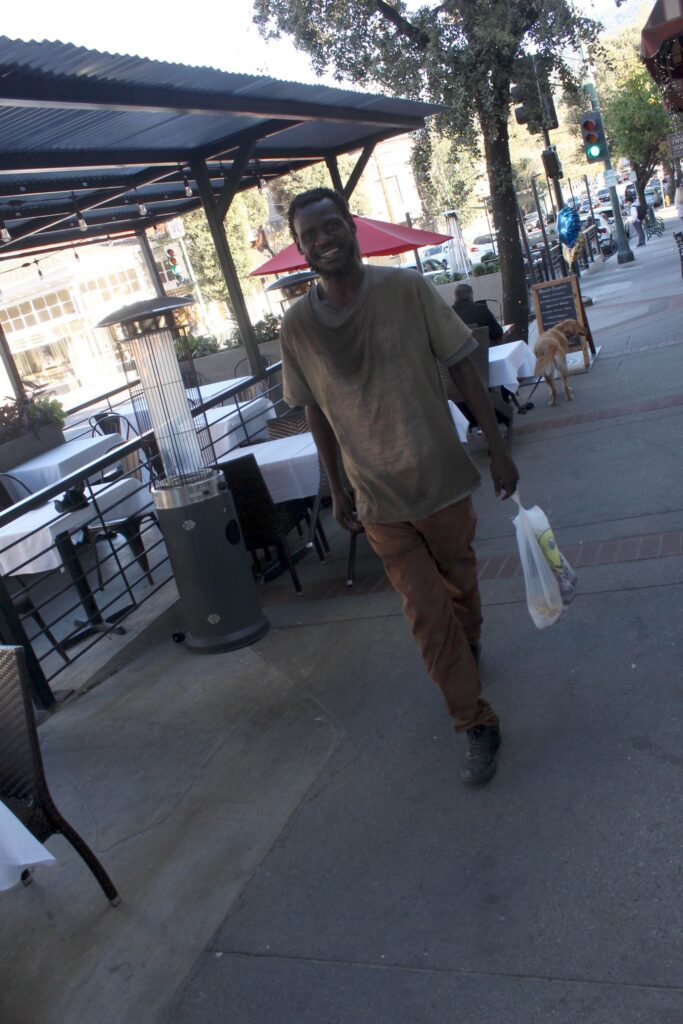
Fania knows all about passages. He grew up in Freetown, the capital of Sierra Leone. He’s his mother’s first born son to a father who served as a cabinet minister in the national parliament. He attended primary school there, before moving back to the eastern district of Kono, where their family’s from—an area whose beauty was depicted with tragic elegance in the Leonardo DiCaprio movie “Blood Diamond.” That’s where he attended a United Methodist Church school.
According to Harvard researchers—who mention his father, S.G.M. Fania, by name—their family is one of the main houses in the Kamara chiefdom. His family had a gold and diamond mining business. His dad was once thrown in jail in the 1960s as a political prisoner ahead of an election, but contested the decision and ended up winning a by-election. That’s according to a Journal of Modern African Studies article from the ‘70s (as quoted by Wikipedia).
Though he was part of a prominent family, he says he was taught to treat everyone equally.
“I didn’t see it as I was better than other people,” he said, adding his father taught him the importance of working hard. “I never get anything free from him, no,” he said, replaying how a typical conversation might go. “‘Pocket money?’ ‘Can you wash my car? Can you mow the grass there?’ ‘Oh yeah.’”
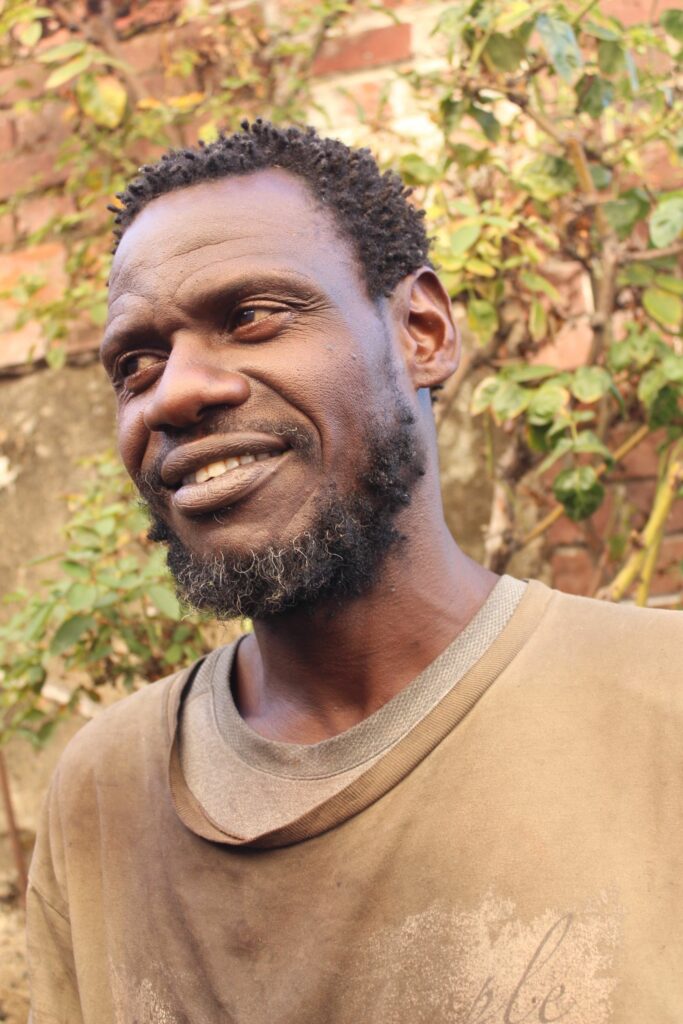
For secondary school, Fania moved inland to the Bombali District, attending boarding school in Makeni, at St. Francis Secondary School.
“The only tough part was attending Mass twice a day,” he said, adding while it wasn’t an abusive environment, it was strict. “The rule is, you cannot strike or punish or beat a child more than six strokes in the school.”
A typical punishment would be to prepare the garden for sweet potatoes, “Irish” potatoes or cassava.
During the civil war his father was again taken prisoner and was tortured, Fania says, adding this would lead to fatal health complications a few years later. In the meantime, Fania had joined the military, where he would serve about six years.
“My dad actually warned me, ‘Don’t go into the army. Don’t join these people,’” he said. “But I didn’t listen. I decided to go there and serve diligently. But when I see my service being sabotaged by some big element I quit. I left for Nigeria.”
The way the rebels relied on child soldiers really got to him, he shares.
“They used them as human shields,” he said. “It was a troubling moment.”
According to Fania, “Blood Diamond” was actually a pretty accurate depiction of the conflict, in all its horror. Nevertheless, it isn’t the memory of his army days that haunts him now, he says. It’s what would come later.
In Lagos, he met a woman in computer programming class and fell in love.
“One day, I just sat on my own table and she sat by my side,” he said, explaining she was asking for help with an assignment. “I said, ‘The teacher is right there,’…’No, I want you.’ That’s how we started.”
They would cook and do laundry together.
“One day, I just came in,” he recalled. “She was praying for me. I didn’t even know somebody was wishing me so much.” But that bliss was short-lived. “She died just after childbirth,” he said. “Something I don’t want to think about.”
Fania worked his way up on the oil rigs to make enough money to give his daughter a good life. He remembers her asking very grown-up questions at a young age.
“She’s book smart, common sense smart,” he said. “You can teach her something just once.”
Fania says it’s tough being estranged, particularly because he promised his dying wife he would look after the girl. His message for his now-teenaged daughter? “I love you. I’m just going through challenging moment right now.”
While in Nigeria, Fania had begun a long-distance relationship with a woman in Sierra Leone who was living in the United States. They married and spent a couple years preparing the paperwork so he could immigrate legally. They even held a traditional wedding ceremony back in their home country.
“I was just looking for someone who could be a motherly figure for my daughter,” he said.
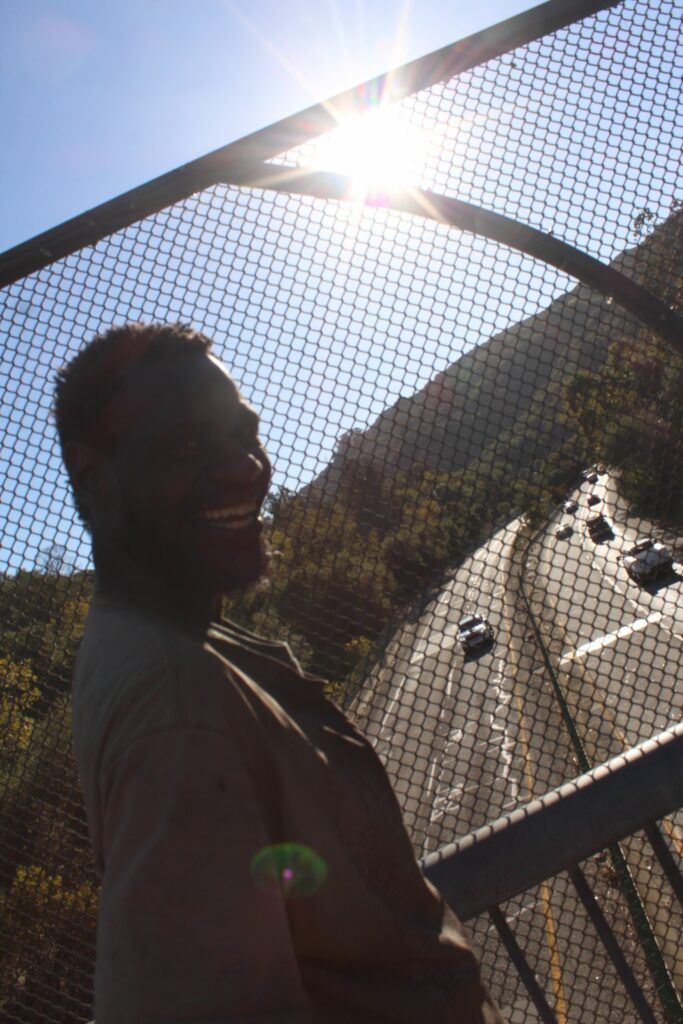
He arrived in San Jose in April 2012, but right off the bat things seemed to go sideways between them.
Reached last week as he touched down for a funeral in Sierra Leone, one of Fania’s other brothers (a Sacramento-based engineer named Sahr Mbriwa Fania) confirmed his younger sibling had legally married the woman, and went through traditional marriage rites, too. He also confirmed they’d experienced a fair degree of marital strife in America. He says he tried to help them fix their issues. His younger brother had been raising her kids from a previous relationship as his own. But in the end it didn’t work out. They filed for divorce in May 2013.
Since then, Fania has been facing paperwork problems that don’t make sense to him. He claims he’s been accused of terrorism and money laundering by some officials, something he vehemently denies.
“I want to know, what’s my crime? If you’re accusing somebody of something, there should be an evidence to back it up.” He says he was even taken to jail in Campbell one time—then released—after being mistaken for someone else. “I’m legally staying here,” he said. “Offhand, I know my Social Security Number. Offhand, I know my A-Number…alien number.”
He says it feels like he’s being shunted toward a situation where he’ll be desperate enough to actually engage in the sorts of things he’s describes being accused of.
“They’re trying to make the lie…look like truth,” he said, adding he needs a new California ID card, but says he’s been getting different stories about what he needs to do next from each government agency he visits.
His brother wonders if they crossed all the t’s and dotted all the i’s on their immigration documents. Fania claims he found out his ex-wife made him look like he’d now be 45, when really he’s only 44, so he’d be closer to her age on paper. These sorts of challenges aren’t exactly unheard of, considering less than 50% of births are registered in many African countries, according to the World Bank.
Fania stayed with relatives in the past (he has more than 30 siblings scattered across the globe). He was living in his car on the border with Campbell when, one day, it was towed to Los Gatos. It would’ve cost him more to get the vehicle back than it was worth, and he ended up sleeping on the street—ironically by the DMV.
“Being outside would help me to deal with a lot of things not accumulating, but it’s difficult anyway, you see?” he said. “You’re not living to your fullest potential. Being homeless you have limited resources.”
At the same time, he points out, it forces you to get in touch with yourself.
“It makes you know your environment instead of the masquerade you see,” he said. “You value things that you never valued. But it makes you vulnerable too. It makes you prone to a lot of danger.”
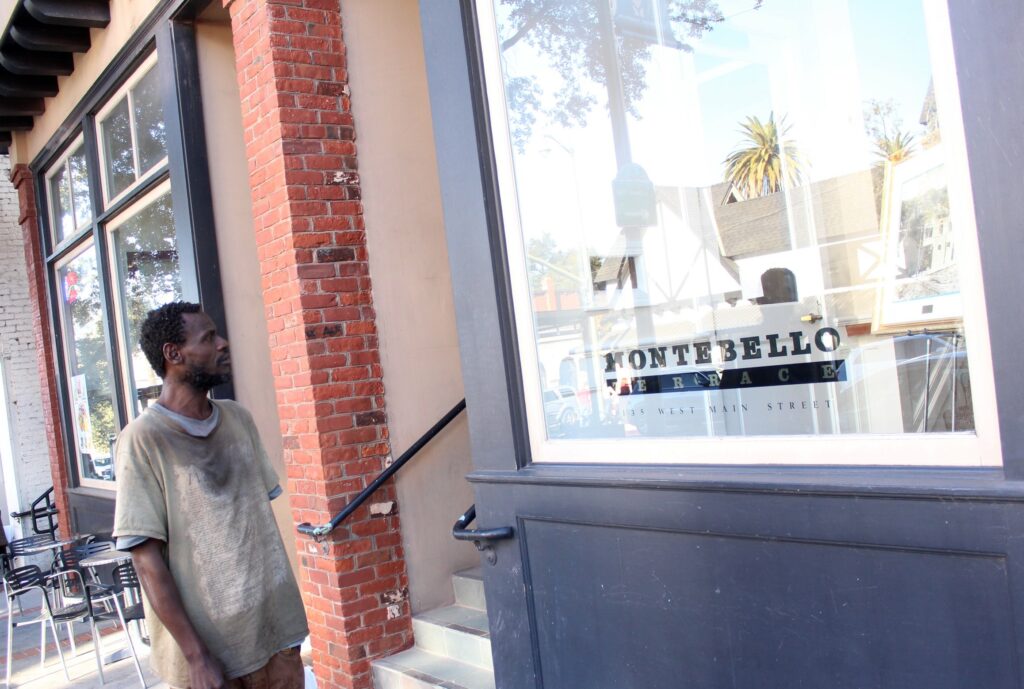
Fania’s older sibling says he hopes to hear his brother will be able to get out of this quandary.
“Tell him to buckle up and get out of the streets,” he said. “His last name’s too big for that.”
The earthy green shirt with the U.S. Constitution printed on it Fania wears for days at a time is “not just any shirt, because it’s standing for human rights,” he said. “It’s standing for freedom. It’s standing for equality. It stands for what this country stands for. And that’s what I stand for.”
After all, that’s why he left the army and moved to Nigeria, he says. He’s frustrated by how, in his case, America seems not to be measuring up to its ideals.
“This is wrong,” he said. “This is abuse of power.”
Once he sorts this all out and gets off the street, he’s going to make a fresh new shirt featuring the Constitution. But he says he’d like to keep the smelly old one as a souvenir.
Fania has been hanging around Los Gatos hoping to connect with a woman he met through a local church who has a therapy method he thinks he can trust. He often has trouble sleeping, but has found a lot of peace here.
“This community is made up of a lot of good people,” he said. “They taught me a lot of skills and I love them. I appreciate all their help and support.”
He’s been planning to head up into the hills to try to locate the woman he believes can help him.
But Sunday wasn’t that day. There were some “puzzle pieces” he needed to collect for a project he was working on, he said. He got up off his mattress, cross-stepped past the proselytizing San Jose man with the Info Wars T-shirt on the corner, and headed toward the Los Gatos High School campus.
There, he examined the inscriptions on the various benches, until he found what he was looking for. It was the plaque for Mark Bingham and Todd Beamer, the 9/11 heroes who prevented terrorists aboard Flight 93 from crashing the plane into government buildings. He considered the significant actions of those men, but was also bothered by how the terrorists could’ve been driven to do something so evil. He made some notes in a booklet, then smiled.
“I think I’ve got what I needed,” he said. “Inner peace.”
Now, he’s dreaming of visiting the ocean.



